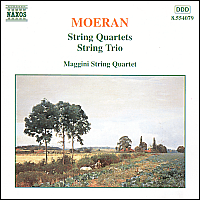Almost seven years after it was recorded, the first
Naxos disc to survey the work of "Jack" Moeran remains one of the most
impressive in the label's catalogue. Even more so than the excellent
contemporaneous disc of music by Frank Bridge, this was the CD that
well and truly put the Magginis on the musical map. Highly idiomatic
discs of Elgar, Walton, Bliss and Bax have since enhanced the quartet's
reputation but this is the still the one I hold in greatest affection.
These quartets brought them into the path of formidable competition
from a (full-priced) ASV disc. The ASV featured the Cork-based Vanbrughs.
The couplings differed offering, instead of the String Trio, the very
Ravelian Piano Trio and the Fantasy (Oboe) Quartet. Why not invest in
both? Faced with a choice though, I would still plump for the Maggini
and not only because of the advantageous price differential. The haunting
String Trio could well be Moeran's chamber masterpiece and, much as
I enjoy the Piano Trio, it has to be heard.
Different commentators fail to agree on the origin
of the two movement E flat major Quartet. Moeran's widow, the cellist
Peers Coetmore, found the manuscript in his papers after his death.
This has prompted some (including the writer of the booklet notes, Keith
Anderson) to suggest that it is an early work. Others, including members
of the Maggini themselves, have since placed it much later, given that
it is very similar, in many ways, to the "Irish" themed works of his
last years. It is a beautifully lyrical piece that combines pastoral
meditation with vigorous, dancing folk tunes and rhythms. The closing
passage, in particular, ingrains itself on the memory very easily. Perhaps
it is the chamber equivalent of the middle movement of the Violin Concerto
and the finale of the Cello Concerto. All three works are alive with
the atmosphere of rural Ireland that Moeran found so inspirational.
The A minor Quartet has much in common with the E flat
major. It is slightly more assured and equally memorable with modal,
pastoral and folk-like pentatonic themes dominant. Like his other quartet,
Moeran ended the piece with an Allegro Vivace, in this case a
Rondo. This is the only chamber music disc, apart from Dvořák
and the Kronos's Pieces of Africa, that I have ever seen
my little daughter actually dance to! It really is that infectious.
The four movement String Trio is more ambitious
(and ambiguous!) than the quartets. The first movement uses a 7/8 time
signature and, though pentatonic, folkish themes still abound. There
is more of a sense of unease or even tension in some passages. Along
the way, we also encounter a cello led misterioso passage and
even some mildly dissonant moments, although the final Andante grazioso-Presto
movement ends the piece in a positive, emphatic manner.
All these pieces are beautifully performed and recorded
and the disc should be totally self-recommending to any fan of British
20th Century music. Although there are some echoes of Vaughan
Williams and Ravel, this music could not have been written by anyone
but Moeran. Like the recent companion orchestral CD, I would encourage
anyone to invest in it - there can be few (if any) better ways to spend
a fiver!!!
Neil Horner


